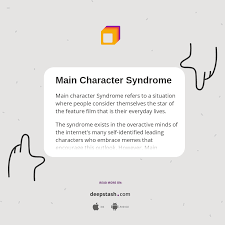In the realm of psychology and pop culture, there’s a phenomenon known as “Main Character Syndrome” (MCS) that has been gaining traction in recent years. It’s a concept that delves into the ways individuals perceive themselves and their roles in the world around them, often blurring the lines between healthy self-confidence and narcissistic self-absorption.
At its core, Main Character Syndrome refers to a mindset where individuals view their lives as if they were the protagonists of their own stories, with the belief that the world revolves around them and that they are destined for greatness. While a certain degree of self-assuredness and a strong sense of self can be beneficial, MCS takes it to an extreme, leading to behaviors that can be detrimental both to the individual and to their relationships.
One of the key characteristics of Main Character Syndrome is an inflated sense of importance and entitlement. Those affected may exhibit a constant need for validation and attention, expecting others to cater to their needs and desires without considering the perspectives or feelings of those around them. This can manifest in various ways, such as dominating conversations, seeking constant praise, or refusing to acknowledge the contributions of others.
Another aspect of MCS is the tendency to view setbacks or criticism as personal affronts. Instead of seeing challenges as opportunities for growth, individuals with Main Character Syndrome may interpret them as evidence of others’ jealousy or incompetence. This can lead to defensiveness, hostility, or even a complete avoidance of anything that threatens their perceived image of themselves as the hero of their own story.
It’s important to recognize that Main Character Syndrome is not solely a product of individual personality traits. Cultural factors, such as the glorification of celebrity culture and the rise of social media, can also contribute to its development. In a world where self-promotion is often rewarded and attention is equated with success, it’s easy for individuals to internalize the narrative that they are the protagonists of their own lives, deserving of admiration and adulation.
So, how can one navigate the fine line between healthy self-confidence and Main Character Syndrome? The key lies in cultivating self-awareness and empathy. By taking the time to reflect on our thoughts and behaviors, we can gain insight into how we perceive ourselves and our interactions with others. Additionally, practicing empathy allows us to consider the perspectives and feelings of those around us, fostering meaningful connections and mutual respect.
Seeking feedback from trusted friends, family members, or mental health professionals can provide valuable insights into areas where we may be exhibiting signs of Main Character Syndrome. By remaining open to constructive criticism and willing to make changes, we can strive to develop a more balanced and authentic sense of self.
Conclusion
Main Character Syndrome is a complex phenomenon that highlights the interplay between individual psychology and cultural influences. While it’s natural to want to see ourselves as the protagonists of our own stories, it’s essential to maintain perspective and humility, recognizing that we are but one part of a larger narrative. By fostering self-awareness, empathy, and a willingness to grow, we can strive to overcome the pitfalls of Main Character Syndrome and lead more fulfilling lives


